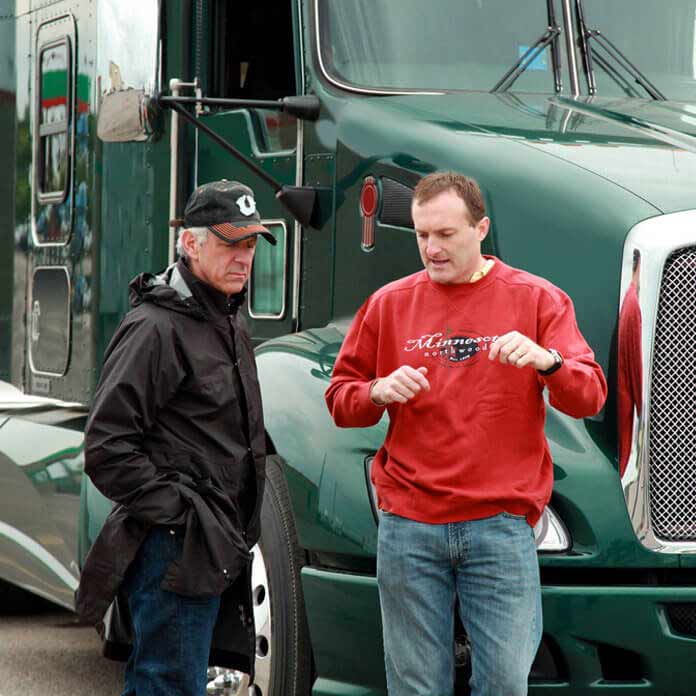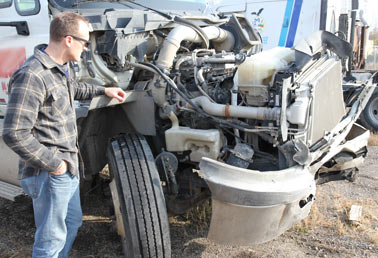Our truck accident lawyers are pushing for higher minimum insurance limits for trucking companies.
“If we don’t raise the insurance limits we’re not following U.S. policy to protect the public from losses caused by at-fault trucks,’’ said Fred Pritzker, a leading truck accident lawyer who represents victims throughout the United States.
Pritzker said the mandatory minimum coverage limit is a safety issue because it’s currently not high enough for insurance companies to thoroughly consider the safety records of carriers when issuing policies.
Survivors of serious truck crashes told federal transportation officials that minimum truck liability coverage is a safety issue. In too many cases, tractor-trailer accident victims aren’t adequately compensated when carriers maintain a legal minimum of only $750,000 of liability insurance for bodily injury.
Those minimum policy limits were set by the government in the 1980s and much has changed since then. Semi truck crashes involve massive rigs—longer, wider and heavier than under previous regulation. Then too, medical costs have skyrocketed to treat patients injured in a truck crash. Many semi-truck accidents involve catastrophic injuries or wrongful deaths.
How much is my truck accident case worth?

Proposed Rule to Increase Minimum Insurance Coverage for Trucking Industry
Last year and in 2016, the U.S. Department of Transportation received 120 submissions of public comment in favor of greater financial responsibility requirements for trucking companies, brokers and freight forwarders. One of those submissions bore the signatures of 11,366 petitioners. They urged United States trucking regulators to use their discretion to raise the insurance limits
But in a decision late last year that went against families, a proposed rule change to increase minimum insurance coverage for the trucking industry was withdrawn by the Federal Motor Carrier Safety Administration (FMCSA).
The agency may have been sympathetic to the arguments of truck crash victims, but the movement or push for higher insurance limits was said to lack sufficient data. Nevertheless, calls for reform haven’t been silenced and victims of truck and bus accidents continue to fight for the industry to take greater financial responsibility.
Higher Trucking Insurance Limits Would Lead to More Careful Evaluation of Safety Performance
If minimum trucking insurance limits were higher, the underwriting market would more carefully evaluate the safety performance of all carriers. Moreover, insurers would be apt to provide incentives more broadly for safe operations. Insurance companies are equipped to evaluate the performance of the motor carriers. In theory, totally unsafe carriers wouldn’t be able to obtain the insurance necessary to operate.
Truck crash lawyer Eric Hageman, who heads litigation against motor carriers for the Pritzker Hageman law firm, said many trucking concerns carry ample liability coverage. In past cases handled by the firm, those higher insurance levels have allowed for payouts of millions of dollars.
In one such case, Pritzker Hageman recovered $5.1 million for a motorcyclist who suffered an amputation injury when an unqualified and overtired delivery truck driver collided with him. In another case, a jury awarded more than $2 million to the family of a Minnesota woman who was run over and killed by a semi-trailer while riding her bicycle.
“When the carrier causes severe injury or death, victims can be left at the mercy of trucking insurance limits depending on all the circumstances. That’s not an appropriate system of compensation for truck crash victims.’’Attorney Eric Hageman
Attorneys Pritzker and Hageman Call on FMCSA to Reconsider Insurance Increase Rule
Hageman, Pritzker and other national truck safety advocates already are calling on FMCSA to reconsider a rulemaking increase. The proposal withdrawn last year was out for public discussion for three years. Meanwhile, the high cost of truck fatalities and serious truck crash injuries continue to be shifted away from the trucking industry when carriers are underinsured. The burden often lands on taxpayers and individual families.

Despite the pullback in 2017, the agency didn’t signal that the issue is dead — only that FMCSA leaders don’t have enough statistics right now to make a decision. With each passing year until the change arrives, many trucking companies will remain woefully underinsured.
“FMCSA has determined that it has insufficient data or information to support moving forward with a rulemaking proposal, at this time,” the agency stated in a notice that appeared almost a year ago in the Federal Register.
How do I protect my truck accident insurance claim?